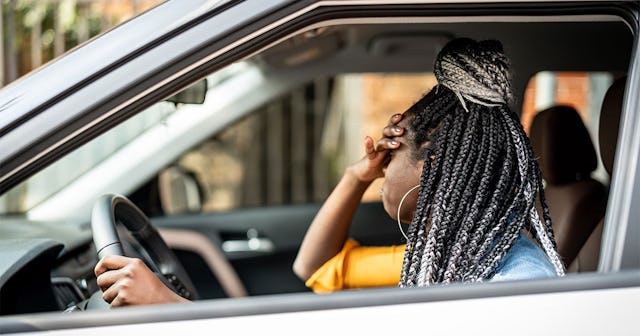Sometimes Empathy Can Be Overrated

My yoga-pant covered legs were curled under the steering wheel, and I was barely holding onto a grocery bag I had grabbed from the backseat as I prepared to vomit. I had pulled over into an old gas station parking lot, sobbing so violently I could no longer see to drive. Ten minutes into my trip home from a beach vacation with friends, I had lost my bearings. I left two days early because I didn’t feel well. Chronically depressed, I am in tune with what I need — and what I needed was to be in my home with my family, my dogs, my bed. So I left. Driving past unfamiliar surroundings, beautiful though they were, triggered something in me that resulted in a release so extreme it felt beyond cognition, beyond emotion, guttural.
I texted my psychiatrist saying I needed to see him soon. Then, I called my husband. When he answered, all he heard was me gulping air and failing at my attempt to hold back sobs. He was quiet at first, and then: “What’s going on?” I told him I was coming home, that I was not okay.
“I do not understand what you are going through.” His response was honest, simple, unapologetic.
I replied without thinking: “I don’t need you to understand. I need you to talk to me about the mundane parts of life at home.”
I heard about pressure washing the sidewalk and the chemical levels in the pool and the weeds growing in the yard. I could picture the laundry unfolded in baskets, dishes piled in the sink, beds unmade – all things he and the kids would have in ship-shape by the time I got home. Right.
Word by word, the intensity of my emotions began to lower, my body still releasing, but this time instead of screams and sobs, it was breath. Fast, medium, then slow. I was okay. I could drive again. And four hours later I would pull into my driveway, still breathing, still okay, home.
I was met with love (and a request for a $500 scooter from my youngest kid), and when I was ready to talk about it, I was met with curiosity. How? Because it’s easier to be curious when you don’t know.
When I had kids I was pretty worried about this not knowing business. I was okay not knowing things like how to work a breast pump. That stuff can be solved in a couple of quick google searches. But not knowing about experiences, the stuff you can’t manufacture – that terrified me, especially when the baby bodies emerged with penises attached, and most especially as those bodies have grown up into middle-schoolers.
I did not do dumb stuff as a kid. I did not smoke things or drink things or get naked with people or find myself talking to a police officer about the mailbox that just got bashed in with a baseball bat. I have no experience with adolescent bad behavior. My worst offense as a teenager was thinking I was smarter than my parents.
I’ve been afraid that since I have never been to a sleepover where kids watch porn in groups while stealing the older sister’s vape, that I wouldn’t be able to guide my kids through these events if (when) they happened.
But it turns out, this is actually the magic part of motherhood: sitting on the couch with a kid who asks if you’ve ever (…) and you say, nope never, tell me all about it. And they do. Because they can tell you really want to know. They can tell that you’re not asking so you can pounce on them with a fiery fist of punishment, but you really want to understand. And in that conversation you lay one small block of trust. And each time they look guilty or stressed or embarrassed, and you ask what’s going on, they’ll remember you really mean it. You really want to know. You really care.
When someone needs you to fix a technical problem (say, there is cat pee and dog vomit on the floor and the social worker is on his way over), then it helps if you know where the towels and stain remover and air freshener are kept. You’ve totally got this. But here’s the thing: Mothering is 10% poop-pickup and 90% important stuff.
When your people need you for the 90%, for figuring out what to do when they’re stuck, or someone to keep them company while they struggle through a difficult relationship, or someone to help them see straight when all seems lost, well, it can really help if you don’t get it. Or even if you do get it, it can help to play dumb.
Lack of understanding feeds relationships. It prevents us from throwing advice darts at everyone in our path. It keeps us from launching ideas out of our mouths at 400 miles per hour while taking a selfie. It helps relieve us of the pressure to get it right, that oppressive voice that ruins everything all the time. Not understanding helps us seek understanding, asking real questions based in genuine interest and compassionate curiosity. Sometimes knowledge is lazy ignorance, a work-around for genuine care. If love is paying attention, then not knowing is a good way to get there.
Not understanding does not mean not caring*. Don’t be afraid of it. Own it. Flaunt it like the gift that it is to you and the people you love.
*Unless, of course, it is about YouTube or Minecraft, in which case it is okay that you neither know nor care.
This article was originally published on